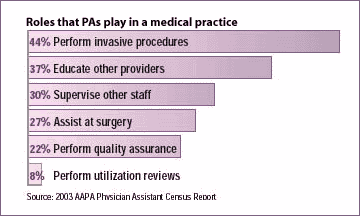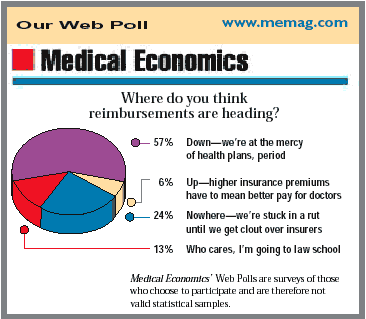Article
UPDATE: Focus on practice
PAs; tough times for groups; moral docs
UPDATE
Focus on Practice
By Joan R. Rose
PAs find a home with primary care physicians
More than half (56 percent) of the physician assistants responding to a recent survey are employed by physicians, most of them in primary care. While the majority of PAs have joined group practices, 13 percent have affiliated with soloists.
Last year, PAs earned as much as, or more than, some general practitioners. According to the Medical Economics Continuing Survey, 17 percent of GPs netted less than $60,000 in 2002. Median income for an established PA was $72,457.

Another medmal insurer exits
Los Angeles-based Farmers Insurance Group has stopped offering new medical malpractice coverage and will not renew existing business beginning next year. The company is withdrawing from all 18 states in which it writes medical malpractice policiesa process that will affect some 1,300 covered physicians and hospitals.
That's bad news for patients, as well. The unavailability of affordable malpractice coverage has doctors turning to new forms of defensive medicine to stem their liability risks, according to a study released by the Center for Studying Health System Change (HSC). In the past, doctors have ordered extensive tests or given up high-risk procedures altogether. Now a growing number of physicians are referring patients to emergency departments rather than treating them in their offices. Others refuse to provide on-call emergency department coverage or decline elective referrals from EDs. Consequently, researchers say, continuity of care and patient choices are being limited.
Business leaders admire doctors' morality
Given a list of five professions, business executives in the nation's 1,000 largest companies were asked which one they perceive as most ethical. The largest number (31 percent) chose doctors, who edged out information technology professionals by 1 percentage point. Accountants pulled another 20 percent, lawyers 5 percent, and investment bankers a mere 1 percent. (The remaining 13 percent of voters didn't answer or didn't perceive any of those listed as having high moral values.)
The poll was sponsored by Robert Half Technology, a recruiter for IT professionals.
Group practice tougher than ever?
Medical group costs increased nearly 7.5 percent last year, while total medical revenue grew by just 6 percent, according to the latest Medical Group Management Association Cost Survey. Ob/gyn, cardiology, and pediatric practices all reported smaller margins than in 2001. Indeed, except for family practice, margins were negative or flat for all specialties observed.
The most important factor driving operating cost increases was liability insurance. Ob/gyn practices, for example, reported a 67 percent increase in malpractice insurance costs between 1998 and 2002, putting those doctors in the unenviable position of now making less than they did five years ago. If medical liability premiums continue to rise and revenues remain flat, "already-struggling medical groups will not be able to endure," warns MGMA president/CEO William F. Jessee.
Our Web poll

Joan Rose. UPDATE: Focus on practice. Medical Economics Dec. 5, 2003;80:10.





